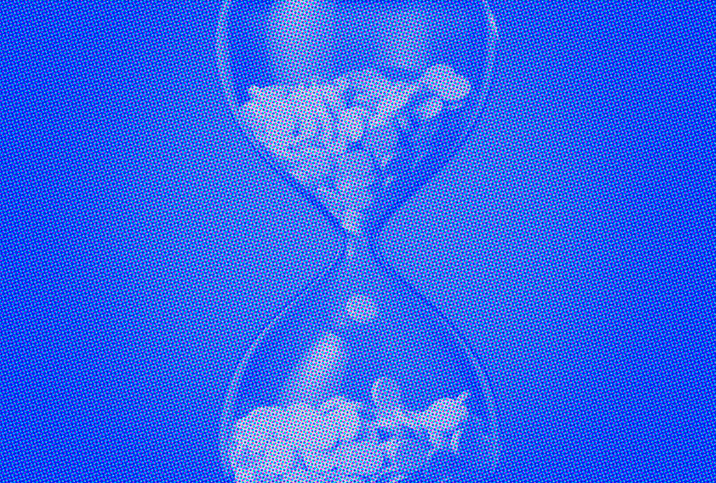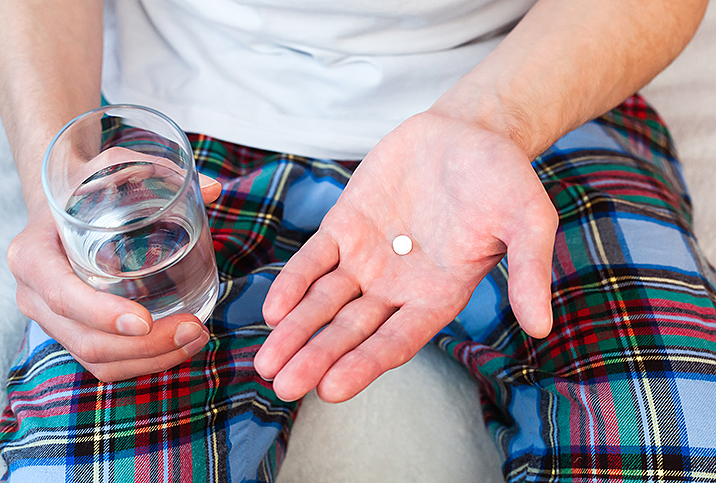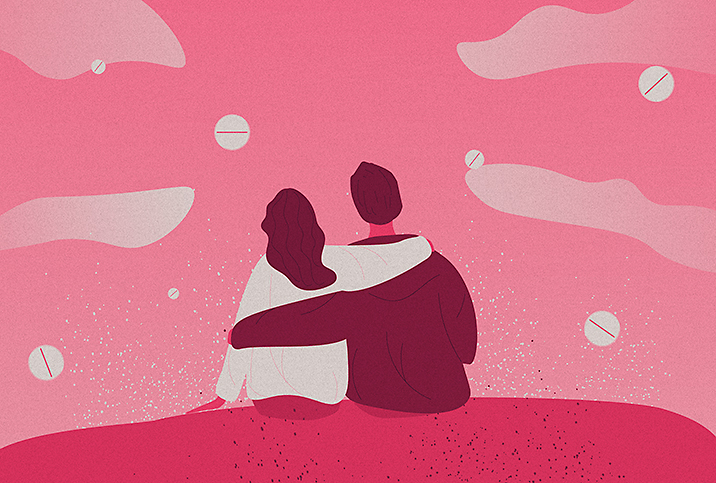So, You're Thinking About Taking an Antidepressant?

Antidepressants can help manage the symptoms of depression. If you're considering taking one, it's best to learn how antidepressants work and their potential side effects so you know what to expect.
What causes depression?
Everyone feels a little down or a little sad on occasion. It's a universal human emotion. However, some people experience something far longer-lasting and often debilitating, otherwise known as major depressive disorder (MMD), or depression.
Depression is a chronic and debilitating mood disorder that causes feelings of sadness, hopelessness and a general loss of interest in life for an extended time.
Major depressive disorder is the most common mood disorder in the United States. People commonly think of depression as a chemical imbalance, particularly calling out low serotonin levels as the cause.
However, studies since the 1990s show that low serotonin doesn't cause depression, according to a 2022 report.
The causes of depression aren't easy to pin down, said Darren Fred, M.D., a psychiatrist working for Heading Health in Houston, Texas. Depression is a complex illness that presents in a variety of ways, so instead of looking for a cause for depression, it makes more sense to look at the following risk factors, according to Fred.
The risk factors for depression include the following:
- Genetics: Genetic studies point to some genetic predispositions to the illness. Scientists think about 40 percent of cases are attributed to genetic predisposition, indicated a target="_blank"2011 report.
- Personality traits: Low self-esteem and poor tolerance to stress.
- Stressors: Traumatic events, financial hardship and personal loss.
"The name itself—antidepressant—is misleading," Fred said. "They often have no direct effect on mood but rather affect how someone responds to stress. If the treatment helps someone tolerate stress better, that can lead to the downstream effect of a better mood, which influences their ability to function well."
What are antidepressants?
Antidepressants are medications prescribed to help with specific conditions. Thirteen percent of adults in the U.S. take antidepressants, according to information from the Centers for Disease Control and Prevention.
There are several classes of antidepressants and they work in different ways.
The most prescribed class of antidepressants is selective serotonin reuptake inhibitors, or SSRIs. You probably know them better by frequently prescribed brand names, such as Lexapro, Prozac and Zoloft.
Another typical prescription for depression is a serotonin and norepinephrine reuptake inhibitor (SNRI). You may better recognize brand names for SNRI's, such as Cymbalta and Effexor.
If neither of these classes of medication is helpful, there are still other choices. Some of these alternatives are prescribed to help a patient with concurrent symptoms such as depression and insomnia. Some classes of antidepressants become a final choice because of their higher risk of side effects.
However, some studies have challenged the helpfulness of antidepressant drugs for mild or moderate cases, suggesting for many people, exercise can be as effective as a prescription, suggested a 2011 report.
The question of how well these drugs work has not been well addressed, raising questions about their widespread use.
Recommended
- The Facts About Antidepressants: Find out how antidepressants affect your sexual health.
- How Might Antidepressants Impact My Sexual Health?: SSRIs may carry bothersome side effects for men, including dysfunction in the bedroom.
- Is Your Diet Making You More Depressed?: Research indicates a direct link between what we eat and how we feel.
How do antidepressants work?
The short answer is we don't really know how antidepressants work.
"SSRIs work by inhibiting the brain neurons' ability to recollect serotonin, a neurotransmitter, which is a chemical the brain uses to send signals," Fred said. "This causes an excess of serotonin in the brain that potentially causes more excitability. Now why they work is where there is still debate."
There are many theories offered to better understand the cause and treatment of depression.
"A theory presented in Stahl's Essential Pharmacology text, a widely used pharmacology text in psychiatric medicine, says it is not the excess of serotonin that causes the benefits, but rather the brain adapting to the excess serotonin," Fred said.
Another promising theory has to do with a finding about the hippocampus, a part of the brain's limbic system that is associated with forming and retaining certain kinds of memories—primarily facts and spatial relationships, learning and emotions. Research participants with MMD have a smaller hippocampus, indicated a 2019 report.
This research proposes antidepressants may work by promoting the growth of synapses in the hippocampus, creating a healthier network of communication among the hippocampus cells.
This growth may happen because antidepressants increase growth factors in the brain, which causes synapse connections to form.
What conditions do antidepressants help with?
Antidepressants can help people with a variety of symptoms and diagnoses. Studies suggest that antidepressants can be helpful for the reduction of the symptoms of the following health conditions, according to Fred:
- Anxiety disorders, such as generalized anxiety and panic disorder.
- Depression
- Post-traumatic stress disorder, or PTSD
"There is some evidence—but less so—for helping with social anxiety, too," Fred said. "The theme of all these diagnoses is stress. Stress is the risk factor."
What side effects should you expect from antidepressants?
You may experience mild side effects when you start taking SSRIs or SNRIs. Your healthcare professional will provide you with a list of possible side effects depending on your medication.
The most common side effects include the following:
- Agitation
- Anxiety or restlessness
- Changes in sleep habits, including increased sleepiness or insomnia
- Dizziness
- Feeling tired
- Increased sweating
- Nausea, loss of appetite, diarrhea or dry mouth
- Tremors or shaking
These symptoms typically improve after a week or two after starting antidepressants.
Antidepressants may also cause negative sexual effects such as a decrease in libido, or sexual desire, difficulty in reaching orgasm or erectile dysfunction, or ED.
Sexual side effects rarely improve with time. If your antidepressants are affecting your sex life, speak with your doctor. You may require a different dosage or a different medication.
Why does it take a while before the drugs work?
"Antidepressants are not like Tylenol where you take it today and you begin to feel better today," said Rhonda Mattox, M.D., a psychiatrist and mental health activist in Little Rock, Arkansas.
"It can take a while for the therapeutic effect to be noticed," Mattox said.
The mystery of why antidepressants take so long to work is wrapped up in the larger puzzle of what causes depression and how antidepressants help.
"While you may experience the sedation of some antidepressants like mirtazapine [Remeron] rapidly or some nausea from sertraline [Zoloft], the actual antidepressant benefits can take two to eight weeks or even longer sometimes, depending on the type of prescription you are taking and the dose," she said.
The theory presented in Stahl's Essential Pharmacology text—that it isn't the excess of serotonin from the SSRIs that helps with depression, but rather the brain adapting to the extra serotonin, Fred said.
That theory may explain why antidepressants can take several weeks to work and often increase anxiety in the first couple of weeks of taking them.
"More simply, this theory suggests SSRIs cause excess stimulation in the brain, and the brain learns to stop responding to it," Fred said. "It becomes less reactive and can thereby tolerate stress better."
Considering the theory that antidepressants stimulate growth and synapse connection in the hippocampus, it makes sense why it takes time for this growth to occur.
What are some myths and misconceptions about antidepressants?
We may not know everything about antidepressants, but we do know enough to squelch the myths that surround antidepressants.
Here are three of the most popular misconceptions about taking antidepressants:
Myth: Antidepressants change your personality or make you less creative
Fact: If you're taking the correct antidepressant, it can help you feel more like yourself. You may have more energy and a healthier outlook on life.
If your prescription makes you feel flat or apathetic, tell your healthcare provider who can change the dose or switch you to a different medication.
Myth: Antidepressants are addictive
Fact: Antidepressants are not addictive or habit-forming the way drugs or alcohol can be.
Some people can experience discontinuation symptoms from antidepressants, such as headache, dizziness and nausea if they suddenly stop taking antidepressants or decrease their dosage too quickly.
It's important to follow your medical provider's instructions for how to slowly decrease the amount you take to avoid or minimize these symptoms.
Myth: Antidepressants will make me gain weight
Fact: Some antidepressants may cause weight gain for some people, while others may cause weight loss. If either side effect is a concern for you, speak to your healthcare provider.


















